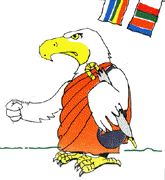Norwegian Peace Initiative
Main Stream Extremism
Peace Process faces Difficult Future
[TamilNet,
September 12, 2005 ]
Reflecting growing anxieties amongst Sri
Lanka’s Tamils in the wake of the Sinhala nationalist forces
gathering behind Mr. Mahinda Rajapakse, the Tamil Guardian
newspaper warned this week that the peace process “will face
an ever more uncompromising Sinhala bloc.” The island’s
political developments, moreover, reflect the polarised
sentiments amongst the island’s communities, the
English-language paper’s editorial column argued.
The
text of its editorial comment, titled “Mainstream Extremism”
follows:
The stark polarisation amongst Sri Lanka’s
ethnic communities is undoubtedly set to deepen further. The
Sinhala right wing coalition that emerged this week behind
Prime Minister Mahinda Rajapakse’s Presidential candidacy is
not just a marriage of political convenience but an
assertive statement of their shared vision of a future Sri
Lanka – one in which the Sinhala-Buddhism is the prevailing
order and the minorities know their place. Mr. Rajapakse is
going to sign an agreement with the Janatha Vimukthi
Perumana (JVP), the third force in the Sinhala politics and
another with the small, but important monks’ party, the
Jeyatha Hela Urumaya. The text of the JVP deal makes grim
reading for those concerned with promoting a peaceful
solution to Sri Lanka’s protracted ethnic conflict. It is a
comprehensive attack on the very foundations of the
Norwegian peace process. Every concept around which dialogue
has been proposed – joint aid mechanism, interim
administration, etc – has been rejected. The ceasefire is
criticised. Even Oslo’s invaluable role in stopping the
bloodshed is denounced.
The most important aspect of
these attitudes, as far as the Tamils are concerned, is that
they are mainstream values in the south. The JVP has been
described as ultra-nationalist, chauvinist and hardline.
These characterisations are all true. But what does it say
about Sri Lanka’s polity that one of the two main candidates
for the most powerful office in the country is basing his
election platform almost wholly on these principles? The
twelve points spelled out in the JVP text are described as
‘conditions’ which Mr. Rajapakse must accept for the party’s
support. But the Tamil perspective on this is quite
different. It is a joint statement of shared values, rather
than imposed conditions.
Mr. Rajapakse’s archrival,
Mr. Ranil Wickremesinghe, is perceived by many observers as
the more liberal. But the Tamils have noted his ready resort
to nationalist positions more than once. Even this week, in
a feeble effort to vie for the nationalist vote, Mr.
Wickremesinghe vowed to usher in a ‘Prarakaramabahu’ era if
he wins. His invocation of the name of a Sinhala king
credited in mythology with unifying the country - by the
sword – is unlikely to endear him to the non-Sinhalese.
The past few years of comparatively stable - at least in
the south - peace and international engagement have not
invoked a spirit of compromise in the Sinhala polity. On the
contrary, mindsets have not changed at all. The unkind and
unwarranted criticism levelled at Norway is a case in point.
The Tamils are grateful for Norway’s diplomatic
intervention, not because of any latent bias, but because it
was a sincere effort to end the war. But what is important
to the Sinhala polity is not the lives saved or the peace
that prevails because of Norway’s intervention, but a
misperceived affront to an even more misguided notion of
national sovereignty. ‘Impartiality’ in southern lexicon –
unfortunately for Norway - means hostility to the Tamil
struggle. We note, with some interest, that not once has Mr.
Wickremesinghe risen to defend the Norwegians’ indefatigable
efforts against the JVP’s bile.
 What
is clear to Sri Lanka’s minority communities is that in the
coming years we will face
an ever more uncompromising Sinhala nationalist bloc
with a firm grasp on power. So will the international
community. Those still optimistic about a liberal peace in a
united Sri Lanka need to seriously reconsider the viability
of their vision. Three decades of violence have not dulled
Sinhala nationalist aspirations, nor have four years of
peace and increasing enmeshment in the threads of
globalisation. On the other hand, these - and a half-century
of increasing Sinhala oppression - have concretised a Tamil
national consciousness. It is these polarised sentiments
that are playing out in the political developments today. What
is clear to Sri Lanka’s minority communities is that in the
coming years we will face
an ever more uncompromising Sinhala nationalist bloc
with a firm grasp on power. So will the international
community. Those still optimistic about a liberal peace in a
united Sri Lanka need to seriously reconsider the viability
of their vision. Three decades of violence have not dulled
Sinhala nationalist aspirations, nor have four years of
peace and increasing enmeshment in the threads of
globalisation. On the other hand, these - and a half-century
of increasing Sinhala oppression - have concretised a Tamil
national consciousness. It is these polarised sentiments
that are playing out in the political developments today. |